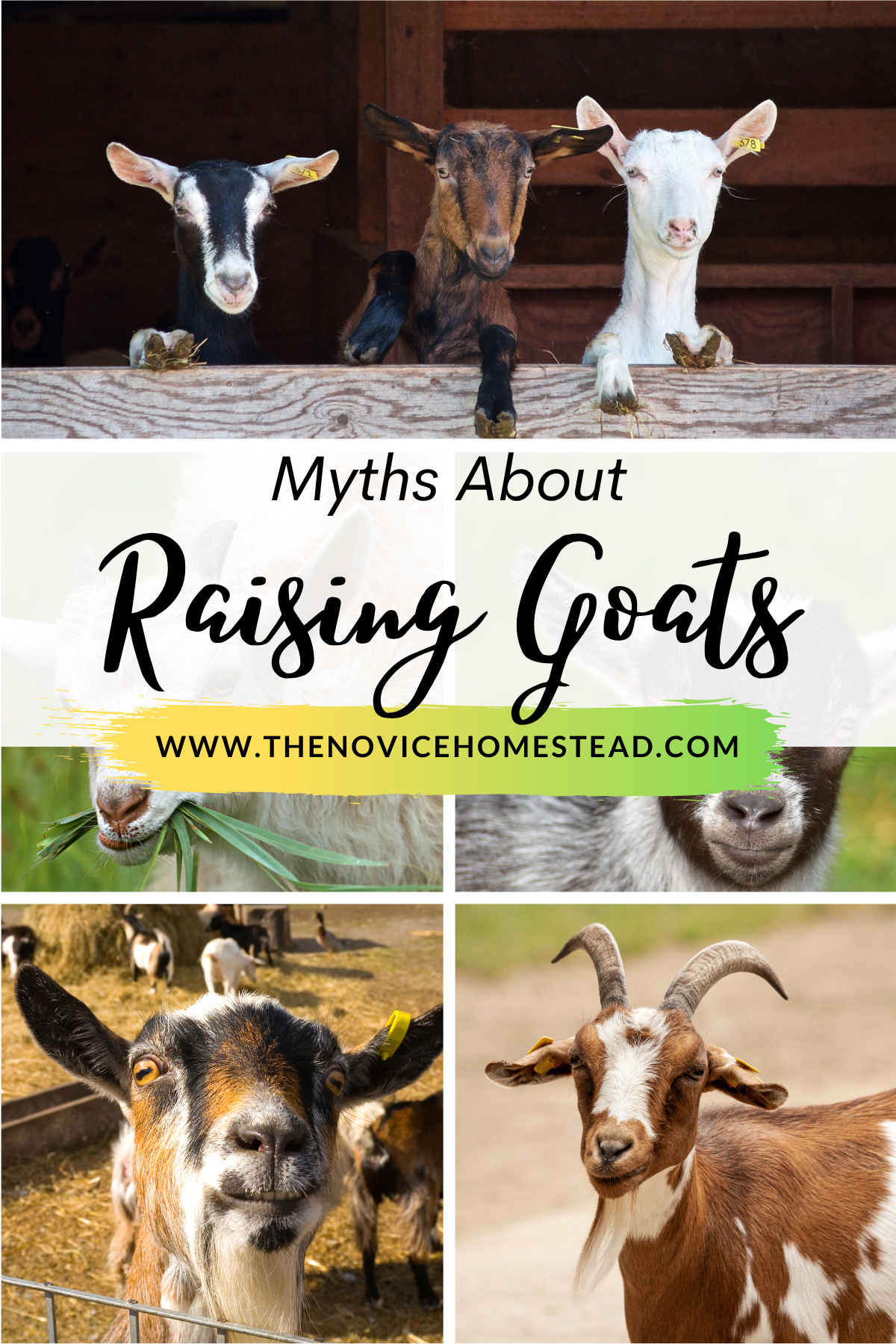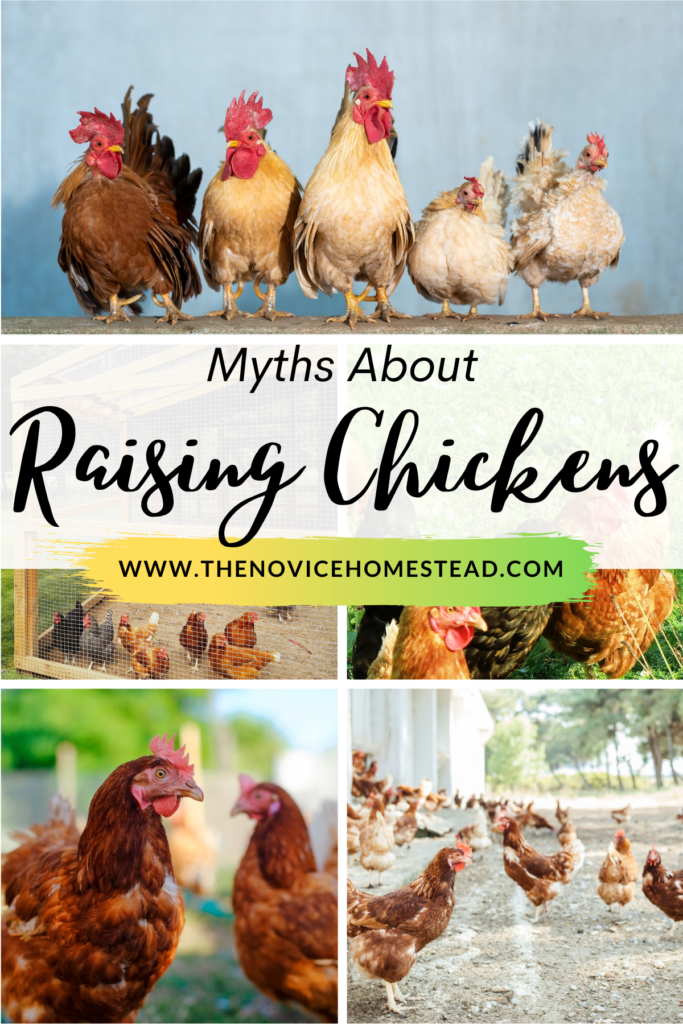Forget what you’ve heard! We’re debunking 8 common myths about goats – knowing these facts will make you a better goat owner!

8 Myths About Goats…Debunked!
There are a lot of misconceptions about goats, from their reputation as a “garbage disposal” to those that say they are dirty creatures.
Let’s get to the truth behind these common myths about raising goats:
1. Goats Eat Everything
Goats have a reputation of being like a living garbage disposal. However, goats can’t, won’t, and shouldn’t eat everything.
Just like any other animal or livestock, goats have specific dietary needs.
While they will happily eat junk food, it is not good for them. Goats need to be able to forage for greenery, as well as supplementing with hay or alfalfa. They may also need copper supplements.
Do not just toss your goats all your leftovers or give them a bunch of treats and expect them to be in optimum health. Like any other living being, goats need good nutrition to live their best life.
2. Goats Will Mow Your Lawn For You
As mentioned above, goats have a preferred diet. Grass is not their natural preference.
While goats WILL eat grass if that’s all they have access to, it is not their preferred food, nor is it the most nutritious for them.
Goats are “browsers,” which means that they like to reach their heads up to snag tasty bites from brush, small trees, bushes, etc.
Goats are often used for clearing areas with heavy brush, but if you’re expecting goats to take the place of your lawnmower or weed-whacker, you may be disappointed.

3. Goats Are Dumb
This couldn’t be further from the truth! Goats are intelligent animals with strong personalities. Within 2 days, my rescue goat Johnny would walk himself from the pasture to his stall for dinner – all I had to do was open the gate. Goats constantly amaze me with their cleverness! That cleverness will also keep you on your toes as they try to outsmart you at every turn!
4. Goats Are Easy Keepers
There’s a misconception that you can get goats, toss them out into a pasture, and they’re good to go.
Goats actually have many needs to stay healthy and happy:
- Shelter: A sturdy shelter to keep them out of the elements during inclement weather and safe from predators at night.
- Nutrition: A well-balanced diet with plenty of browsing and supplemented to make up for any nutritional gaps.
- Medicine: Regular worming and vaccination to prevent parasites and communicable diseases.
- Care: Frequent grooming to keep their coats free from burrs, matts, and pests such as goat lice.
- Space: Goats kept in too small of an area are more susceptible to parasites that build up in the soil.
One thing I do want to note about goats is that even with the best of care, goats are not good patients when they get sick. They seem to “give up” easily. That’s why it is so important to make sure you’ve thoroughly researched before you start keeping goats and keep a close eye on them for any behavioral or physical changes that might indicate a problem. It’s much easier to treat goats when you’ve caught an issue early.
5. Goats Are Escape Artists
This one is partially true – goats will quickly show you any weaknesses in your fencing or shelters. However, it IS possible to keep goats contained with sturdy fencing. Knowing what works before you set up your goat enclosure will save you a lot of headaches down the road!
The best fencing options for goats are: woven wire (specifically for sheep and goats) or electric wire netting fences. Field fencing can work, but over time the goats may break the welds because they will push on it – whether trying to escape or simply scratching an itch.
Fencing to avoid with goats: cattle or hog panels (goats can get their heads stuck in the large openings), barbed wire (goats can squeeze through even 9-strand barbed wire fencing, and pretty much anything not listed above!
I’ve watch my own goat squeeze through our 9-strand barbed wire fencing. However, field fencing did work for a time. We also hosted a BIG herd of goats to clear some of the heavily wooded areas on our property and not a single one of them escaped their electric netting enclosure!

6. Goats Can Be Out To Pasture 24/7
As mentioned above, goats require a shelter. Cows and horses are often kept primarily at pasture and often don’t mind being out in the rain. Goats do not want to be out in the rain. I did not know this when I first started with goats and I found out very quickly that even the smallest drizzle would start my goat calling for “hhaaallllpp!!” They often would rather be cooped up in their shelter rather than stand in any amount of precipitation.
7. Goats Are Too Stubborn To Train
Goats ARE stubborn. But they are generally good-spirited animals and can be trained, as long as you have reasonable expectations.
Goats very quickly learn routines and will happily go “home” when it’s time for dinner. They can be taught to walk on a lead.
Patience and consistency are the key.
8. Goats Are Dirty
Yes, goats can get dirty when they’re outside. However, they are generally pretty clean and will often groom themselves.
Goat droppings are similar to rabbit droppings: they are small round balls that are easy to scoop up with a shovel. If you keep their enclosure and shelter clean, it won’t be stinky.
No, I wouldn’t have my goat in my house, but as far as animals go, they’re pretty clean and not very smelly at all! (Now, bucks can be a different story, but I don’t raise them so I can’t speak to that).
You might also like:
